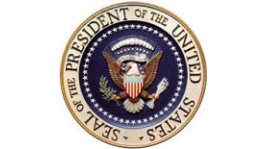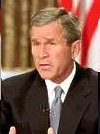U.S. Government Information
The President

 U.S. President George W. Bush
U.S. President George W. Bush
|
Presidential Records. In the recent past we have heard much about the Presidential Records Act (PRA) of 1978. Spawned by the Watergate scandal of the 1970s, this law "changed the legal ownership of the official records of the President from private to public". (5) While there are provisions and stipulations in PRA that can affect the timing of the release of presidential records, it is generally accepted that these records will be available for public scrutiny 12 years after the President leaves office. The law applies to the documents of those Presidents who served from 1981 onward, and offers historians, journalists, and the general public the opportunity to research these records in full. In short, these documents become the property of the United States,
|
To the concern of many, executive order 13233, issued by President George W. Bush on November 1, 2001 has thrown the PRA into an uncertain light. The order gives incumbent Presidents executive privilege to withhold a former President's records, even if that former President agrees to have them released. Using this order, President Bush withheld over 68,000 pages of documentation from the collection of former President Ronald Reagan. Faced with legal pressure from opponents of the executive order in both parties, President Bush had NARA partially release some of the withheld records. It appears that the full effect of executive order 13233 on the release of future presidential records remains to be seen, as there are those who are intent on seeing that it does not stand.
Presidential Libraries. The National Archives and Records Administration is currently responsible for overseeing the Presidential Library system , a network of 10 libraries and museums devoted to accommodating the presidential records, and other material of historic value, of former Presidents since Herbert Hoover. Many of the earlier Presidential Libraries were established in a time when presidential records were not the subjects of federal legislation, and when former Presidents could (and little doubt did) walk away with some of their more "delicate" material when they left office. Enactments such as the PRA mentioned above, and the Presidential Recordings and Materials Preservation Act of 1974 have sought to set guidelines to what records a former President may or may not take with him when he leaves office (4). However, again, the impact of Executive Order 13233 may prove to be a major factor regarding the availability of these records in the future.

